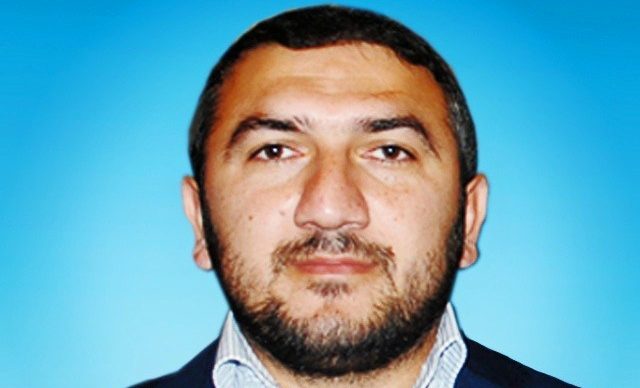Little-Known Islamist Editor Imprisoned in Azerbaijan As Others Released

As editor-in-chief of the Islamist news website Xeber44.com in Azerbaijan, Araz Guliyev crusaded for religious freedom and against what he saw as local corruption.
Guliyev used Islamic rhetoric to criticize the government, but not to provoke violence or a religious revolution, according to family and friends interviewed recently by Capital News Service. The local government didn’t see it that way, however.
After working as a journalist for only two years, Guliyev was arrested and sentenced to eight years in prison on charges of illegal possession of firearms, participation in activities that disrupt public order, inciting ethnic and religious hatred, resisting authority, and offensive action against the flag and emblem of Azerbaijan.
Guliyev’s supporters say the charges have no merit. They say the case is meant to silence one of the few religious voices willing to speak up in a post-Soviet country with a proudly secular government, but also fearful that conservative Muslims want to impose a theocracy like the one in neighboring Iran.
His brother Azer told Capital News Service in a phone interview from Azerbaijan that the case is “not about religion at all, but the violation of human rights and government corruption.”
All societies need journalists, but in religious-dominated regions such as the one Guliyev comes from in southern Azerbaijan, these journalists struggle to find the right way to expose the truth to their own communities. Guliyev used his journalism to tell religious people to stand up for their rights. To the Azeri government, this sounded too much like radical Islam, according to experts on Azerbaijan.
“They are using the religious moral argument, which allows the regime to spin that as more of a religious issue than as a focus on corruption” said Audrey Altstadt, history professor at the University of Massachusetts, Amherst.
Guliyev had a religious upbringing in Masally, a southern town close to the Iranian border. He was working in a furniture factory when he was fired in 2010 for reportedly distributing prayer cards, his colleague Mirelem Hesimov told CNS in an interview over Facebook messenger from Azerbaijan.
With a population that is 96 percent Muslim, state approval is required in Azerbaijan to teach, preach or lead religious ceremonies, and it is illegal for Muslims to pray outside of a mosque.
Jobless, Guliyev partnered with Hesimov, a computer expert, to create a website initially called Yahmedi. “Ya Mehdi” is a call to the Shi’a messiah. Aware of the name’s radical associations, the men changed the name to Xeber44 — “Xeber” meaning news, and 44 the tag number for cars registered in Masally, Hesimov told CNS.
With Guliyev as the editor-in-chief, Xeber44.com published both religious and non-religious articles covering social issues in Masally and around the country. Pressure from local officials to stop writing was instantaneous, said Hesimov.
In April 2011, about a year after the publication was launched, Guliyev was stopped by traffic police and allegedly dragged out of his car by his hands and feet into the police vehicle, FaktXeber—a Baku-based news organization—reported at the time.
Police also stopped his brother without reason on the same day. The brothers were detained for five days while local prosecutors investigated their involvement in a rally that was set to take place in the following days, the same Azeri news website reported.
The next month, in May, Azerbaijan won the Eurovision song contest, an annual international TV singing competition that attracted more than 100 million viewers. Celebrations erupted around the country. The victory meant that Azerbaijan would host the next musical extravaganza, which the Azeri government saw as an opportunity to market itself to a skeptical Europe.
Religious activists in Masally, however, denounced the glitzy, sequin-filled singing competition, and protested against the celebrations. Guliyev was arrested for participating in these protests.
According to an article in Yeni Musavat— a Baku-based news website— Guliyev was arrested for yelling inappropriate words at the partygoers. He was detained for five days in the police station. At trial they were found guilty of disobeying police orders. The judge in the case considered their outbursts to be an insult to national pride.
CRACK DOWN
Azerbaijan’s neighbors, Russia to the north and Iran to the south, have both sought to influence politics in their smaller neighbor. The US maintains close relations too, because of the country’s strategic location, extensive oil reserves and cooperation with the US and Israel on counterterrorism issues.
The Aliyev family has ruled Azerbaijan since 1993, two years after it declared its independence from the former Soviet Union. Though the Azeri constitution once limited the presidency to two five-year terms, Ilham Aliyev amended it in 2009 to eliminate term limits. His authoritarian government has remained in power ever since.
In the wake of the Arab Spring uprising throughout the Middle East in 2011, Azerbaijan experienced civil disobedience by youth and opposition parties seeking a more representative form of government and an end to the Aliyev family’s well-documented corruption.
In its 2012 World Report on Azerbaijan, Human Rights Watch said the country’s human rights record deteriorated in 2011, as “the government cracked down on all forms of protest and imprisoned dozens of youth activists after sham trials.”
Though the country is majority Muslim, the government, with Soviet roots, remains secular. A 2009 religion law allows the government to censor and control all aspects of religious life.
In December 2010, for example, the Education Ministry banned girls from wearing the hijab head covering in public schools. The ban resulted in mass protests among religious students.
Azerbaijan’s ambassador to the United States, Elin Suleymanov, explained in an interview that this decision is based on Azerbaijan’s policy to separate church and state. “We insist the people in public schools have no manifestation of religious identity,” he told Capital News Service.
Suleymanov compared the hijab ban in Azerbaijan to US desegregation efforts in the 1950s. Fundamentalist Islamic adherents, he said, insist that women and men remain separate, which he considers a “deliberate attack on the fabric of society.”
Diplomatic relations between Iran and Azerbaijan deteriorated after the ban. Several clerics and members of parliament in Tehran criticized Azerbaijan’s secular nature. The increased activities of the Islamic Party of Azerbaijan and Iranian-backed religious youths are examples of Iranian attempts to establish support among religious Azeris, according to a white paper on Azerbaijan-Iran relations written by PONARS Eurasia, a network of academics researching politics in Russia and Eurasia based at George Washington University in Washington DC.
In the wake of the 2012 Eurovision contest, Iran withdrew its ambassador from Baku for the duration of the contest. Senior clerics referred to the event as a “gay parade,” and publicly urged Muslims in the country to protest the anti-Islamic affair.
Ambassador Suleymanov said Iran wants a society based on “Shi’a law,” but Azerbaijan made the choice to remain secular.
“We built our own path,” he said. “It’s not for others to decide, we are now an independent country.”
An Azeri blogger who goes by the name North Caucasus Caucus and knows Guliyev’s work, explained to CNS in an email that “Guliyev was a journalist, but definitely with a political Shi’a activist bent who was arrested during a whole wave of arrests in 2011 and 2012 around major tensions between Azerbaijan and Iran.”
THE ARREST
On Sept. 6, 2012, Guliyev and religious activist Rza Agali were beaten and taken to the Masally Regional Police department by two drunk officers.
The police chief apologized for the mistake and let the men go at 3 a.m. the following morning, according to Hesimov.
In Azerbaijan, a country with more than 100 political prisoners, Guliyev’s arrest may not have been a mistake at all, but a premature attempt to silence him for good, Alex Raufoglu, an Azeri journalist based in D.C. told CNS.
Two days later, religious activists protested the inclusion of a disco party in Masally as part of a folklore festival, Guliyev testified at his trial, according to the Dinimiz Islam Facebook page author who covered the court proceeding.
At 10 p.m. Guliyev noticed a group congregating outside the town’s youth center. When he approached the crowd to learn what was happening, police dismissed him, saying he was not allowed to be there, despite having presented his journalism credentials.
About an hour later, he returned to the youth center, where only policemen remained. He ran into Ziya Tahirov, another Masally local, and said about 25 plain-clothed men approached them as they were walking away, the Facebook post quotes Guliyev as saying.
The men yelled insults and chased after and threw stones at Tahirov and Guliyev. At his trial, Guliyev admitted throwing stones back at the men because he didn’t know what else to do.
Guliyev recalled being surrounded by the plain-clothed men and police on a small street before being arrested and taken to the police station.
Eleven days after Guliyev’s arrest, his house was searched and authorities said they found a grenade inside. “Illegal possession of firearms” was added to the long list of charges against him, according to a report about political prisoners published by the Norwegian Helsinki Committee.
THE TRIAL
Guliyev was arrested on hooliganism charges. The charges multiplied as he sat in pretrial detention.
Guliyev was tried at the Lankaran Court on Grave Crimes with seven other religious activists from Masally, including Agali and Tahirov.
A recording from the trial posted on YouTube by Cenub News— the new name for Xeber44,— captured Guliyev’s strident statements before the judge.
“I love my country, I love Masally, and I love every part of my country,” he declared, according to a translation of the proceeding. “I am always ready to fight for my country and its freedom.”
Supporters in the courtroom joined Guliyev as he began chanting “Allahu Akbar,” an Islamic phrase meaning “God is the greatest.”
Four articles from Xeber44 were used against Guliyev at his trial to prove he was “inciting ethnic and religious hatred,” Hesimov told CNS.
The articles criticized the Aliyev government. In one, titled “Impunity Will Not Remain Unanswered,” Guliyev condemns Azerbaijan’s religion law that bans prayer outside of mosques and the distribution of religious material as a “religious war against God.”
“You could argue against corruption on the basis that it is economically a waste of resources, on a sort of general moral basis, that you are depriving the public the fruits of someone’s labor,” said Altstadt, the Azerbaijan scholar. But Guliyev argued on the grounds of religion.
According to Hesimov, Xeber44 took a religious angle to gain the trust of the religious Masally people as both sources and loyal consumers.
The Helsinki Committee report highlighted the contradictions between the testimonies given in the investigation and those given at trial.
One witness who confirmed for investigators that a grenade had been found in Guliyev’s home, reportedly could not read or write. He later admitted to being taken from his job by police officers to act as a witness and that he received the equivalent of $13 for his efforts.
Guliyev’s alleged victims, mostly police officers, supplied no evidence to support the injuries they claimed to have suffered from Guliyev’s rock throwing. The Azeri flag Guliyev allegedly tore was not presented at his trial.
He was defiant during the proceedings. “You can’t scare me with false charges,” Guliyev told the court. “I will not remain silent and will tell the truth, no matter if you sentence me for 5 years, 10 years, 15 years, or give me a lifetime in prison, or a death penalty… Just so my nation lives free!”
In April 2013, Guliyev was convicted of illegal possession of firearms, participation in activities that disrupt public order, inciting ethnic and religious hatred, resisting authority and offensive action against the flag and emblem of Azerbaijan. He was sentenced to eight years in prison.
The decision was upheld January 2014 at the Shivran Court of Appeal.
MEDIA
Independent news organizations that cover religious issues outside of Baku are extremely rare, and according to Raufoglu, Guliyev and his team were doing something new, “like emerging a new type of journalism.”
Xeber44 became popular just as the government began its bigger crackdown on media freedom. In its 2015 report, Freedom House, an independent watchdog organization, labeled Azerbaijan’s press as “not free.”
“The authorities used spurious charges and investigations to shut down media organizations and detain several prominent journalists, bloggers, and freedom of expression advocates,” the report said.
Azeri journalist Arzu Geybulla, described the current news environment as dismal.“.
“Now you have almost no independent media outlets in the country,” He said.
According to Altstadt, most people get their news from TV, which is 100 per cent controlled by the Azeri government. The most reliable news, she says, are online publications, though computer ownership is not widespread.
The BBC and the U.S.-funded Radio Free Europe/Radio Liberty and Voice of America have been banned from Azerbaijan’s airwaves since 2009.
TALYSH IN MASALLY
Geography was not on Guliyev’s side either. In the early 90’s, the Talysh people, an ethnic minority from Guliyev’s region in the South, attempted to become an independent state. The movement lasted only three months, and fell when Aliyev’s father, Heydar Aliyev, became president. Now, the government cracks down on anything that looks like Talysh pro-independence activity.
Azerbaijan is about the size of Maine. To lose territory in the south to a secessionist movement, especially because Iran’s population is Islamic Shi’a, would be a serious threat to the state, Altstadt said. “It would be irrational for the regime to pay no attention to these things.”
The alleged grenade placement, for example, could be interpreted as an attempt to make it seem like a Talysh person was planning a secessionist or independence movement, said Catherine Cosman, senior policy analyst at the United States Commission on International Religious Freedom. Realistically, however, she said they “don’t necessarily want to secede, they just want more rights”
According to Altstadt, the regime could be in great danger if the religious opposition should overlap with the national minorities. The Talysh, one of the largest ethnic groups in Azerbaijan, could pose an even greater threat because of their proximity to Iran, she told CNS.
At least 13 million ethnic Azeris live in Northern Iran, more than live in Azerbaijan. Crossing the border is easy and many do it to buy cheap goods and healthcare, journalist Raufoglu told CNS.
US-AZERBAIJAN RELATIONS
In the weeks leading up to President Aliyev’s March 2016 visit to Washington, the Azeri government released 148 political prisoners, including four journalists.
Guliyev is one of four journalists who remains behind bars.
Because of his religious background, Guliyev’s case is never raised by American or Azeri activists, said Askar Askarov, Azeri editor at Voice of America. According to political development consultant Lincoln Mitchell who once worked with political parties in Azerbaijan, the U.S. government can’t be completely truthful about the realities there.
“If we were making our alliances based on the idea that we aren’t going to work with the worst dictators, we wouldn’t work with Aliyev,” he told CNS in an interview.”… there is too much at stake.”
The Aliyev government claims to be fighting radical Islamists, but is actually just trying to preserve its power, Mitchell said.
“Our biggest obstacle for years in Washington has been the people who have been doing their darnest to paint the government as a model of Westernism against extremism,” Askarov told CNS.
PRISON
Guliyev has seen the inside of three Azeri prisons, each with poorer conditions than the last. In December 2014, Prison No. 14 inmate Elshad Babayev was allegedly beaten to death by prison guards, according to several Azeri online news sites.
Guliyev and other prisoners protested his death, and were transferred to a “punishment cell” in Tubzon, a so-called treatment prison, for 15 days.
Tubzon is meant for sick patients but its prison director refused to allow Guliyev’s family to visit, saying Guliyev was there for a medical examination, according to a Cenub News article written at the time.
After being returned to Prison No. 14, the district court ordered Guliyev’s transfer to the closed, and notoriously harsh, prison in Qobustan reserved for the most dangerous criminals. According to Azeri lawyer Javad Javadov, who is familiar with Guliyev’s case, authorities often punish arrested activists by placing them with murderers, rapists and other violent criminals.
Guliyev’s case has been submitted to the European Court of Human Rights, where it is awaiting review.
Meanwhile, Guliyev’s appeal to be moved to Qobustan to a less harsh prison was rejected.
His brother told CNS he is allowed outside one hour a day.
Campaign
About this Site
Pressuncuffed.org seeks to encourage and promote rigorous student reporting, scholarly research and debate on the role of, and obstacles to, independent journalism in the United States and abroad. Our website features reporting by University of Maryland students about press freedom in the United States and abroad. It also offers resources to instructors elsewhere who may want to teach classes or hold workshops on this theme. In the near future, this site will become a place for student work from around the country and abroad.
Dana Priest, two-time Pulitzer Prize winner at The Washington Post and Knight Chair in Public Affairs Journalism at the University of Maryland.


